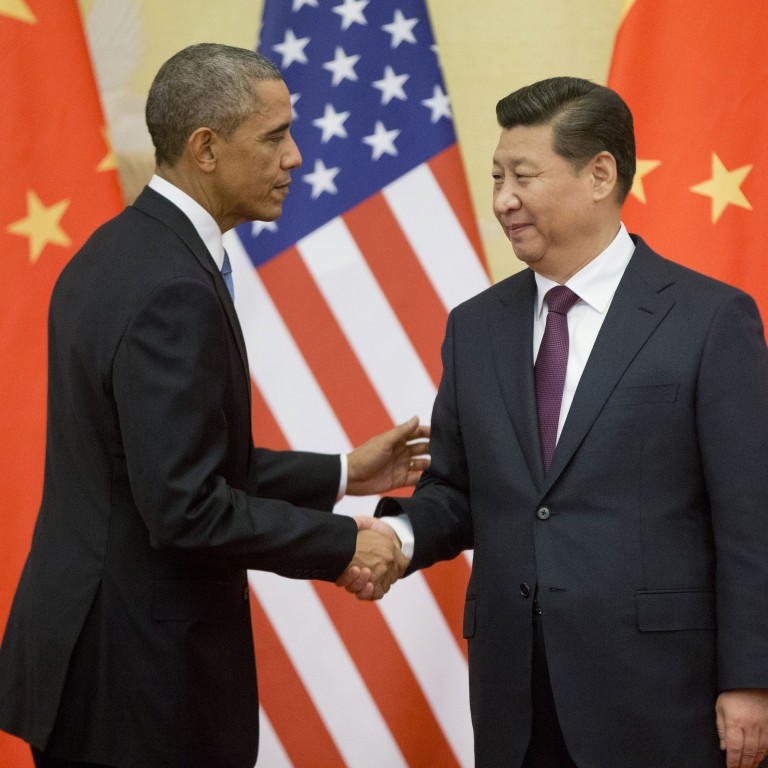
Mutual respect for international laws can keep the peace between China and the US
Jerome A. Cohen says while there are good prospects for Sino-US cooperation and compromise in many areas, for contentious issues like the South China Sea, both must accept their obligations under international treaties
Although China's increasingly "assertive" international conduct has naturally stirred widespread concern in both Asia and the US, especially regarding the South China Sea, an overview of Beijing's foreign policy suggests a less alarming perspective. In some major subjects, such as environmental pollution and climate change, there are good prospects for Beijing's cooperation with the United States and other nations.
Next week's annual Sino-American Strategic and Economic Dialogue should illustrate the continuing ability of the world's two economic superpowers to develop compromises regarding trade, financial and investment problems that inevitably arise. Despite certain compliance issues, China's participation in the World Trade Organisation has, on the whole, been positive, as has much of its direct investment in an expanding list of countries. Indeed, through its newly established Asian Infrastructure Investment Bank and related organisations, Beijing is now pursuing an innovative and constructive financial course, to the embarrassment of our own government.
Beijing, as well as Taipei, should also be given credit for the past seven years of cooperation across the Taiwan Strait that have significantly improved stability and security in Asia. But the impending departure from office of Taiwan's president, Ma Ying-jeou, and growing Taiwanese fears of the mainland dictatorship's threat to the island's democracy should alert us to the forthcoming renewal of tensions.
Of course, we do not see eye to eye with China on a number of controversial issues, including North Korea, the Middle East and Ukraine, and evolving Sino-Russian relations generally require our greater attention. Yet other issues raise even more serious challenges.
Among the most abiding is Beijing's continuing violation of obligations it has assumed in over 20 international human rights treaties and related documents. The proposed legislation designed to restrict the activities of foreign non-governmental organisations and educational organisations will surely have a further adverse effect on Beijing's international relations.
Coming to grips with the devastating cyberattacks now being attributed to China - and the much less-publicised American cyberattacks on China - may prove to be the most difficult topic confronting our two governments, since, as yet, there are no specific international laws or institutions for dealing with it.
Most immediately threatening to our relationship, however, is today's drama in the South China Sea. Here, fortunately, the UN Convention on the Law of the Sea does provide not only rules for determining conflicting maritime claims but also legal institutions for impartially applying those rules.
In 2013, the Philippines stunned China by bringing an arbitration challenging Beijing's expansive and vague "nine-dash line" and seeking to confirm crucial distinctions between submerged "reefs", bare "rocks" and credible "islands". The arbitrators' decision promises to clarify the legitimacy and legal consequences of the troublesome Chinese "land reclamation" projects that have profound military implications.
Thus far, unfortunately, China, while seeking to defend its actions in the realms of propaganda and scholarship, has refused to submit to the independent arbitration tribunal's jurisdiction. These impartial experts are expected to rule on their jurisdiction this winter. If China thumbs its nose at an adverse decision and a subsequent determination of the merits of the dispute, it will be in blatant violation of the UN convention obligations that it freely ratified after taking an active part in the long negotiations preceding the treaty.
As recently underscored by Singapore's distinguished legal expert Tommy Koh, who presided over the successful conclusion of the Law of the Sea negotiations, China, in flatly rejecting all opportunities for peaceful settlement of maritime as well as territorial disputes through international arbitration, adjudication and other third-party procedures, is plainly out of step with the practices of other Asian countries and the rest of the world.
To be sure, impartial dispute resolution often cannot replace negotiations, but it can always do much to narrow the issues and stimulate as well as inform diplomats who have thus far failed to propose and agree upon the imaginative solutions that are urgently required.
The present crisis in the South China Sea has a significance that goes far beyond the immediate claims involved. If China - and the United States, which has not yet even acceded to the Law of the Sea treaty - cannot agree upon and respect in practice mutually beneficial rules and institutions for peacefully settling disputes, the future of both countries and the world community will surely be gloomy.
This issue must be placed high on the agenda for Xi Jinping's visit to Washington in September.

